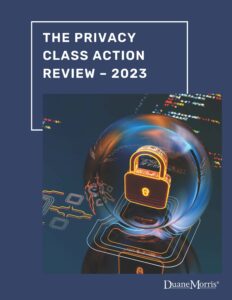 By Gerald L. Maatman, Jr. and Tyler Zmick
By Gerald L. Maatman, Jr. and Tyler Zmick
Duane Morris Takeaways: As we previously blogged, on February 17, 2023 the Illinois Supreme Court held in Cothron v. White Castle, 2023 IL 128004 (2023), that a separate claim for damages accrues under the Biometric Information Privacy Act (“BIPA”) each time a private entity scans or transmits an individual’s biometric data in violation of Sections 15(b) or 15(d) of the statute. On July 18, 2023, the Illinois Supreme Court denied White Castle’s petition for hearing, resulting in the February 17 ruling becoming the final “law of the land” in Illinois. The Court’s decision to deny White Castle’s rehearing petition was not unanimous, however, as reflected by the blistering dissent penned by Justice Overstreet and joined by Chief Justice Theis and Justice Holder White. For companies involved in BIPA class action litigation, the dissent is required reading, as it foreshadows an array of defense-oriented arguments over damages issues in privacy litigation.
Illinois Supreme Court’s Majority Decision In Cothron
In a 4-3 split ruling, the Illinois Supreme Court held on February 17, 2023 that a separate claim accrues under the BIPA each time a private entity scans or transmits an individual’s biometric data in violation of Sections 15(b) or 15(d), respectively.
Relying on the statute’s plain language and the fact that the actions of “collecting” and “disclosing” biometric data can occur more than once, the Supreme Court agreed with Plaintiff’s interpretation – namely, that Section 15(b) “applies to every instance when a private entity collects biometric information without prior consent” and that Section 15(d) “applies to every transmission to a third party.” Cothron, 2023 IL 128004, ¶¶ 19, 23, 28. The Supreme Court acknowledged that this interpretation – coupled with the statute allowing prevailing plaintiffs to recover up to $1,000 or $5,000 for each “violation” – could lead to astronomical damages awards that may be “harsh, unjust, absurd or unwise,’” id. ¶ 40 (citation omitted), but noted that it must apply the statute as written and that policy-based concerns should be addressed by the Illinois legislature.
Dissent To Majority’s Decision To Deny White Castle’s Rehearing Petition
On July 18, 2023 the Illinois Supreme Court denied White Castle’s petition for rehearing in Cothron v. White Castle, effectively leaving White Castle with no further avenues for challenging the ruling.
Three Justices (the same three who dissented to the February 17 majority decision) disagreed with the decision to deny White Castle’s petition for rehearing. In opining that the Supreme Court should have granted rehearing, the Dissent focused on three issues, including: (1) the majority’s “per scan” theory of liability subverting the intent of the Illinois legislature; (2) the majority’s “per scan” theory of liability threatening the survival of Illinois businesses and raising “significant constitutional due process concerns,” id. ¶ 70; and (3) the majority’s decision in failing to provide trial courts with criteria to use in exercising their discretion whether to award statutory damages for BIPA violations.
First, the Dissent stated that the Illinois legislature meant for the BIPA to be a straightforward remedial statute that allows individuals to choose to provide (or not to provide) their biometric data after being informed that the data is being collected, stored, and potentially disclosed. The Dissent rejected the majority’s “flawed construction” of the statute, which mistakenly presumes that the legislature meant for the BIPA to “establish a statutory landmine” and “destroy commerce in its wake when negligently triggered.” Id. ¶ 73; see also id. (“The majority’s construction of the [BIPA] does not give effect to the legislature’s true intent but instead eviscerates the legislature’s remedial purpose of the [BIPA] and impermissibly recasts [it] as one that is penal in nature rather than remedial.”).
Second, the Dissent opined that by construing the statute to allow for awards of statutory damages that bear no relation to any actual monetary injury suffered, the majority’s decision raises due process concerns that “raise doubt as to [the BIPA’s] validity.” Id. ¶ 74; see also id. ¶ 75 (“The legislature’s authority to set a statutory penalty is limited by the requirements of due process. When a statute authorizes an award that is so severe and oppressive as to be wholly disproportioned to the offense and obviously unreasonable, it does not further a legitimate government purpose, runs afoul of the due process clause, and is unconstitutional.”).
Finally, the Dissent took issue with the majority’s refusal to clarify its February 17 holding with respect to the discretionary (rather than mandatory) nature of liquidated damages under the statute. Specifically, the Dissent noted that the majority opinion did not provide trial courts with standards or criteria to apply in determining whether to award statutory damages in a particular BIPA case and, if so, in what amount. The Dissent asserted that the Supreme Court should have agreed to clarify “that statutory damages awards must be no larger than necessary to serve the [BIPA’s] remedial purposes” and to “explain how lower courts should make that determination.” Id. ¶ 85. Per the Dissent, “[w]ithout any guidance regarding the standard for setting damages, defendants, in class actions especially, remain unable to assess their realistic potential exposure.” Id.
Implications For Corporations
Assuming White Castle cannot convince the U.S. Supreme Court to grant review of the Cothron decision based on constitutional issues, Cothron is now the final law of the land in Illinois. White Castle and other BIPA defendants may, however, attempt to raise constitutional challenges to the statute in other BIPA cases moving forward based on the same concerns expressed by the three dissenting Justices in Cothron.
The denial of White Castle’s rehearing petition indicates that the well is beginning to dry for businesses in terms of potential BIPA defenses. While employers and other BIPA defendants can still explore novel defenses, such as the exception for information captured from a patient in a health care setting or challenges to personal jurisdiction, many companies caught in the crosshairs of BIPA class actions will face pressure to settle due to the risk of facing monumental potential damages. Moreover, attempts to reform the BIPA statute failed in 2023, and the Illinois legislature likely will not consider any further reform proposals until 2024. Given the bleak outlook of the law as it stands, it is imperative that businesses immediately ensure they are compliant with the BIPA.









